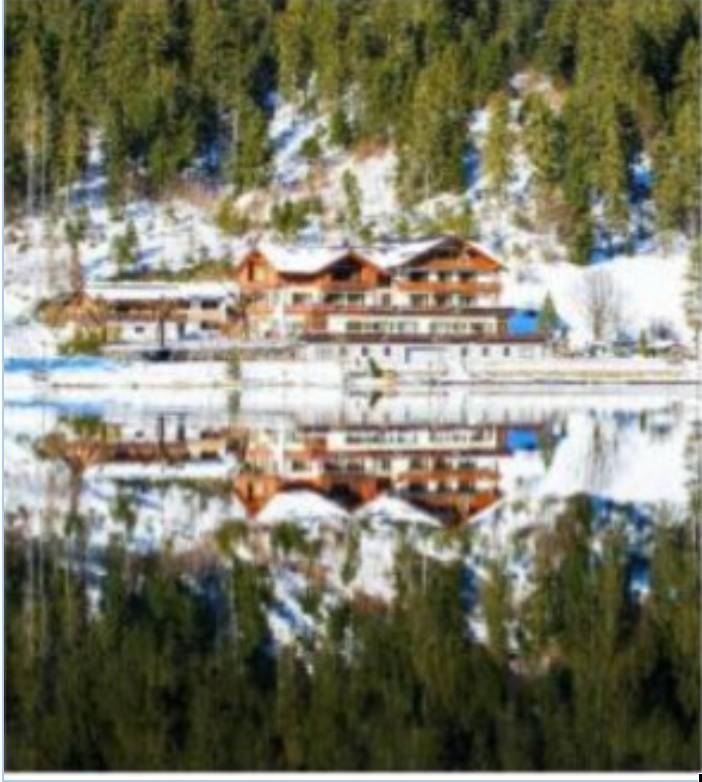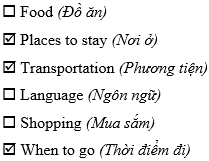Hãy nhập câu hỏi của bạn vào đây, nếu là tài khoản VIP, bạn sẽ được ưu tiên trả lời.

- The hotel rooms where Camilo stayed were clean and the food was good.
(Các phòng khách sạn nơi Camilo ở đều sạch sẽ và đồ ăn ngon.)
- The weather was bad.
(Thời tiết xấu.)

Anna: Nam, why do you think children should do housework?
(Nam, tại sao bạn nghĩ trẻ em nên làm việc nhà?)
Nam: Because (1) doing housework helps them develop life skills.
(Vì làm việc nhà giúp các em phát triển các kỹ năng sống.)
Anna: It’s true. Life skills such as cooking, cleaning or taking care of others are really necessary for kids when they grow up.
(Điều đó đúng đấy. Các kỹ năng sống như nấu ăn, dọn dẹp hay chăm sóc người khác thực sự cần thiết cho trẻ khi lớn lên.)
Nam: Yes, we should all have these basic life skills to be adults.
(Đúng vậy, tất cả chúng ta nên có những kỹ năng sống cơ bản này để trở thành người lớn.)
Anna: Now Minh, why do you think children shouldn’t do housework?
(Giờ thì Minh, tại sao bạn nghĩ trẻ em không nên làm việc nhà?)
Minh: I think kids are kids. (2) They may break or damage things when doing housework.
(Mình nghĩ trẻ em là trẻ em. Các em nên được dành nhiều thời gian chơi khi chúng còn nhỏ.)
Nam: I don’t agree with you. I’m afraid too much playtime isn’t good for children.
(Mình không đồng ý với cậu. Mình e rằng thời gian chơi quá nhiều sẽ không tốt cho trẻ em.)
Anna: Well, thank you both for sharing your ideas. They are very useful for my project.
(Được rồi, cảm ơn cả hai đã chia sẻ ý kiến của mình. Chúng rất hữu ích cho dự án của mình.)

- Yes, he did.
(Đúng vậy.)
- Troy doesn’t have a healthy lifestyle.
(Troy không có lối sống lành mạnh.)

- Pete was preparing for the presentation with his friends when the alarm went off.
(Pete đang chuẩn bị cho buổi thuyết trình với bạn bè thì chuông báo cháy vang lên.)

The second conditional sentences: (Câu điều kiện loại hai:)
- “I would go over budget if I traveled by plane.”
(Tôi sẽ vượt quá ngân sách nếu tôi đi bằng máy bay.)
- “I would also ride a motorbike if I had time.”
(Tôi cũng sẽ đi xe máy nếu có thời gian.)
- “If I weren't busy, I would go with you.”
(Nếu tôi không bận, tôi sẽ đi với bạn.)

I/ Choose the best second sentence so that it has a similar meaning to the first one
1. It was breakfast-time when Susan rang
a. When Susan rang i have just finished my breakfast.
b. Susan rang after 1 had had my breakfast.
c. I was having my breakfast when Susan rang.
d. I was going to have my breakfast as soon as Susan rang.
2. Adrian's job interview is on 17 October.
a. Adrian will be called for a job interview on 17 October.
b. Adrian is giving a job interview on 17 October.
c. Adrian had an interview for a job on 17 October.
d. Adrian is having a job interview on 17 October.
3. You can get off this train at Bath.
a. This train stops at Bath.
b. This train is going to stop as Bath.
c. You can stop this train at Bath
d. This train will be stopped at Bath.
4. We have deccided to help with the project.
a. We helped with the project.
b. We must help with the projet.
c. We will hepl with the project.
d. We are going to help with the droject.
5. The last time 1 went swimming was whenwe were in Spain.
a. I swam a lot when we were in spain.
b. I hadn't been swimming before we moved to Spain.
c. I haven't been swimming since we were in Spain.
d. I went swimming while we lived in Spain.
6. They spoke too quickly for us to understand.
a. They spoke so quickly that we couldn't understand it.
b. They spoke so quickly that we couldn't understand them.
d. They spoke quickly enough so that we couldn't understand them.



- Susan / She prefers the blue ones. Because they look comfortable and sound amazing.
(Susan / Cô ấy thích những cái màu xanh hơn. Bởi vì chúng trông thoải mái và nghe tuyệt vời.)